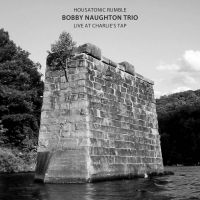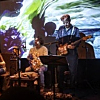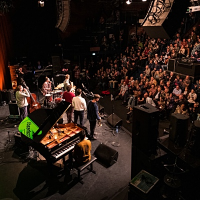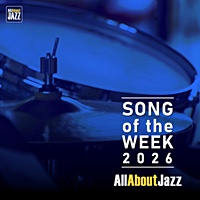Home » Search Center » Results: Bobby Naughton
Results for "Bobby Naughton"
Results for pages tagged "Bobby Naughton"...
Bobby Naughton

Born:
Bobby Naughton is self-taught as a performer and composer. After playing piano in rock-and-roll groups he took up the vibraphone in 1966, and in the late 1960s played with Perry Robinson, Sheila Jordan, and others. He continued to work intermittently with Robinson while recording as a leader on his own label, Otic; in 1971 he wrote a score for Hans Richter's silent film Everyday (1929). He played with the Jazz Composers Orchestra in 1972 and Leo Smith (from the mid 1970s), and joined the Creative Musicians Improvisors Forum in New Haven, Connecticut. Naughton's vibraphone playing, like that of Gunter Hampel, emphasizes the instrument's role in group improvisation rather than its possibilities as a solo vehicle
Bobby Naughton Trio: Live at Charlie's Tap

by Mark Corroto
Today, a number of drummers, including Ches Smith and Kenny Wollesen, also double on vibraphone, underscoring the instrument's fundamentally percussive nature. In the hands of Bobby Naughton, however, the vibraphone functioned as something more expansive: a reimagined piano, capable of both harmonic depth and rhythmic propulsion. Naughton began studying piano at the age of ...
Live at Charlie's Tap

Label: NoBusiness Records
Released: 2025
Track listing: Bounce; Shepaug Strut; Calves; Nauxtagram; Housatonic Rumble; Slant; Composition 23J;
Vashkar; José Josh; Pomperaug Diversions; Slant (version 2); Shepaug Strut (version 2).
Joe Fonda Quartet: Eyes on the Horizon

by Alberto Bazzurro
Quattro super-leader, fra cui anche il nostro Tiziano Tononi, per il quale far parte di questo illustre consesso rappresenta un'autentica medaglia, compongono l'organico protagonista di questo notevole album a nome del bassista (nonché, qui ma non solo qui, anche flautista) Joe Fonda, fresco settantenne, una carriera iniziata nei primi anni Ottanta proprio accanto a Wadada Leo ...
Joe Fonda: Eyes On The Horizon

by Mike Jurkovic
As we enter into the season of giving, what better gift can there be than Eyes on the Horizon, bassist/composer Joe Fonda's sonic tribute to his mentor, muse, and like-minded creator, trumpeter Wadada Leo Smith. As if welcoming one to a grand destination, Smith's clear and majestic timbre, supported by Fonda's pronounced bowing, proclaims ...
Joe Fonda: Eyes On The Horizon

by Mark Corroto
When a musician who is a legend himself, herein bassist Joe Fonda, creates an album of tribute music to his mentor and teacher, it is rare that that person also performs on the recording. Fonda wrote the seven compositions heard here, with five dedicated to the master musician Wadada Leo Smith. On Eyes on The Horizon, ...
Lakecia Benjamin, Bobby Naughton, and Raymond Scott

by Jerome Wilson
This show features some reimaginings, Lakecia Benjamin reworking her own music, and two contemporary groups revisiting Raymond Scott's novelty pieces. The program also contains work by Bobby Naughton, Josh Berman, and Lena Bloch, among others. Playlist Henry Threadgill Sextett “I Can't Wait Till I Get Home" from The Complete Novus & Columbia Recordings of ...
Francesco Aroni Vigone: Orbita

by Mark Corroto
Believer or nonbeliever, either way it is simply impossible to deny the doxological nature of saxophonist Francesco Aroni Vigone's Orbita. His solo recording has a paradisiacal, even divine, sense about the sounds captured in this 32-minute disc. The Italian Vigone might be best known for his work in groups led by clarinetist Giancarlo Locatelli and bassist ...
Leo Smith and New Dalta Ahkri

by Daniel Barbiero
Coming to New England: Emerson, Ives and Brown When trumpeter/composer Leo Smith returned to the United States after having spent 1969-1970 in Europe, he settled not in New York, as most jazz musicians might be expected to do, or even in Chicago, where he'd spent a fruitful several years in the 1960s. Instead, he chose to ...
Solo Vibraphone Hartford

Label: OTIC Records
Released: 2019
Track listing: Untold Tale; Hapnes, Portrait of Braxton; But Beautiful; Andersen Etude; Jesus Maria; Doctor; Changes;
Goodbye Porkpie hat; Ictus; Stardust.


















